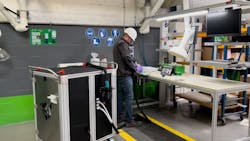Advancing Excellence in Aircraft Component Repair and Maintenance
Aerospace manufacturing brings advancements in additive manufacturing, robotics and automated inspection systems, where precision and efficiency are key factors. Global commercial air travel expansion is a pivotal catalyst for the aerospace parts manufacturing sector. With a rising demand for air transportation among passengers worldwide, the need to produce more aircraft escalates, fueling the demand for aerospace parts and components.
The defense and military sector is a substantial consumer of aerospace parts. Governments worldwide allocate resources to bolster defense expenditures, strengthen national security, and sustain military prowess. This drives the requirement for aerospace parts across various military platforms, including aircraft, helicopters, missiles and other defense systems. In addition to the continuous advancements in aerospace technologies, you can see why the industry is continually growing.
The Vital Role of FAA Approval and Nadcap Accreditation
To ensure that aerospace components uphold the highest standard, having Federal Aviation Administration (FAA) approval in the industry signifies that a particular aircraft, aircraft component, system or process meets the regulatory standards. FAA approval is essential for aerospace manufacturers, operators and service providers, as it validates that their products or processes comply with FAA regulations and are safe for use in the national airspace system.
Additionally, Nadcap accreditation serves as a hallmark of excellence in aerospace and defense manufacturing. Endorsed by major aerospace manufacturers and regulatory bodies, it evaluates suppliers' compliance with industry-specific standards and requirements. Achieving Nadcap accreditation demonstrates a company's commitment to quality, process control and continuous improvement, instilling customer confidence and fostering trust within the industry.
Recently, SIFCO ASC’s facility in Texas achieved both FAA approval and Nadcap accreditation, further strengthening our commitment to improving the aerospace and defense industry. To accomplish these industry milestones, we went through an application process, pre-assessments, and an extensive on-site audit of our facility’s operations, methods and quality management systems. Each involves rigorous testing, evaluation and documentation to demonstrate compliance with airworthiness standards, design requirements, performance criteria and operational guidelines.
Aerospace components face extreme conditions during flight, including temperature variations, corrosion and mechanical stress. These factors require advanced surface finishing techniques to enhance durability, corrosion resistance and conductivity.
SIFCO ASC supports the aerospace industry with selective electroplating applications. Certified FAA-approved repairmen can deposit plating materials precisely only where needed, ensuring optimal coverage and minimal material waste
With its recent FAA approval and Nadcap accreditation, SIFCO ASC reaffirms its position as a trusted partner in the aerospace industry.
These indispensable benchmarks safeguard the integrity, reliability, and safety of aerospace products and operations while upholding the industry's reputation for excellence and innovation.
Lillian Smereczynsky, quality manager, SIFCO ASC, explores the requirements of aviation authorities, ensuring that every component repair upholds the highest airworthiness and passenger safety standards.

